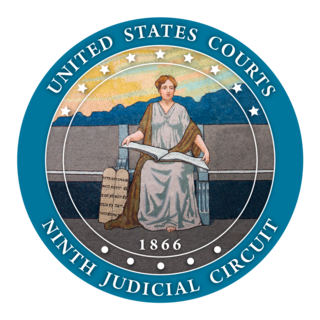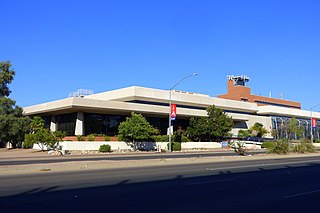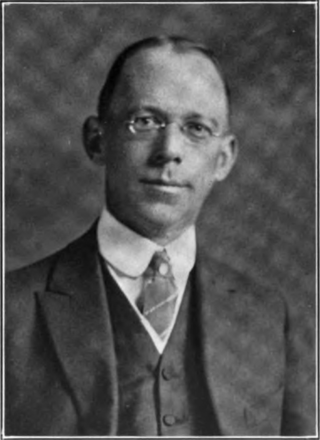The United States Bankruptcy Court for the District of Arizona is the United States bankruptcy court in Arizona; it is associated with the United States District Court for the District of Arizona.
The United States Bankruptcy Court for the District of Arizona is the United States bankruptcy court in Arizona; it is associated with the United States District Court for the District of Arizona.

The United States courts of appeals are the intermediate appellate courts of the United States federal judiciary. They hear appeals of cases from the United States district courts and some U.S. administrative agencies, and their decisions can be appealed to the Supreme Court of the United States. The courts of appeals are divided into 13 "Circuits". Eleven of the circuits are numbered "First" through "Eleventh" and cover geographic areas of the United States and hear appeals from the U.S. district courts within their borders. The District of Columbia Circuit covers only Washington, DC. The Federal Circuit hears appeals from federal courts across the entire United States in cases involving certain specialized areas of law.
United States bankruptcy courts are courts created under Article I of the United States Constitution. The current system of bankruptcy courts was created by the United States Congress in 1978, effective April 1, 1984. United States bankruptcy courts function as units of the district courts and have subject-matter jurisdiction over bankruptcy cases. The federal district courts have original and exclusive jurisdiction over all cases arising under the bankruptcy code,, and bankruptcy cases cannot be filed in state court. Each of the 94 federal judicial districts handles bankruptcy matters.

The United States Court of Appeals for the Ninth Circuit is the U.S. federal court of appeals that has appellate jurisdiction over the U.S. district courts for the following federal judicial districts:

The United States District Court for the District of Arizona is the U.S. district court that covers the state of Arizona. It is under the United States Court of Appeals for the Ninth Circuit.

University of Arizona James E. Rogers College of Law, also known as the University of Arizona College of Law, is the law school at the University of Arizona located in Tucson, Arizona, United States and was the first law school founded in the State of Arizona, opening its doors in 1915. It was renamed in 1999 in honor of broadcasting executive James E. Rogers, a 1962 graduate of the school, and chairman of Sunbelt Communications Company based in Las Vegas, Nevada.

William Nelson Runyon was the acting governor of New Jersey from 1919 to 1920 and a United States district judge of the United States District Court for the District of New Jersey.
Northern Pipeline Construction Company v. Marathon Pipe Line Company, 458 U.S. 50 (1982), is a United States Supreme Court case in which the Court held that Article III jurisdiction could not be conferred on non-Article III courts.

The Sandra Day O'Connor College of Law is the law school at Arizona State University in Phoenix, Arizona. The school is located in the Beus Center for Law and Society on ASU's downtown Phoenix campus. Created in 1965 as the Arizona State University College of Law upon recommendation of the Arizona Board of Regents, with the first classes held in the fall of 1967. The school has held American Bar Association accreditation since 1969 and is a member of the Order of the Coif. The school is also a member of the Association of American Law Schools. In 2006, the law school was renamed in honor of Phoenix resident, Stanford graduate, and retired Supreme Court Justice Sandra Day O'Connor.

McClain Airlines was an airline based in the United States that operated Boeing 727-100 aircraft in an all first class configuration. The airline intended to operate Los Angeles (LAX)— Chicago (ORD) flights. The airline was headquartered in Phoenix, Arizona.
The Federal Rules of Bankruptcy Procedure are a set of rules promulgated by the Supreme Court of the United States under the Rules Enabling Act, directing procedures in the United States bankruptcy courts. They are the bankruptcy law counterpart to the Federal Rules of Civil Procedure.

David Grant Campbell is a senior United States district judge of the United States District Court for the District of Arizona.

George Washington English was a United States district judge of the United States District Court for the Eastern District of Illinois. Charged with abuse of power and other offenses, English was impeached by the United States House of Representatives on April 1, 1926, and resigned his position before proceedings could continue.
John Carbone Porfilio is an inactive Senior United States circuit judge of the United States Court of Appeals for the Tenth Circuit and a former United States District Judge of the United States District Court for the District of Colorado.

The Naval Justice School (NJS) is an educational institution of the United States Navy whose mission is to instruct Navy, Marine Corps, and Coast Guard officers and enlisted personnel in the fundamental principles of military justice, civil and administrative law, and procedure. In addition to being licensed attorneys in any state or territory of the U.S., all attorneys in the Judge Advocate General's Corps must undergo training either in this institution, or in the complementary institutions of the United States Army and the United States Air Force, allowing them to act as trial or defense counsel at military courts-martial.
Louisville Joint Stock Land Bank v. Radford, 295 U.S. 555 (1935), was a decision by the Supreme Court of the United States that ruled the Frazier–Lemke Farm Bankruptcy Act unconstitutional in violation of the Fifth Amendment. This unanimous decision was one of the Court's many rulings that overturned President Roosevelt's New Deal.
Charles G. Case II is a Federal Bankruptcy Court Judge for the United States bankruptcy court, District of Arizona. He was appointed on January 5, 1994 and reappointed on January 5, 2009.
A Referee in Bankruptcy or Bankruptcy Referee was a federal official with quasi-judicial powers, appointed by a United States district court to administer bankruptcy proceedings, prior to 1979. The office was first created by the Bankruptcy Act of 1898, and was abolished by the Bankruptcy Reform Act of 1978, which created separate United States bankruptcy courts with permanently assigned judges.

William Gordon Mathews was a Federal judge and lawyer from Charleston, West Virginia, serving as Referee in Bankruptcy for Kanawha, West Virginia 1898–1908, and Clerk of the Court for Kanawha 1903–1904.
Perez v. Campbell, 402 U.S. 637 (1971), was a case in which the Supreme Court of the United States held that Arizona's law suspending a driver's license was unconstitutional due to its conflict with the federal Bankruptcy Act under the Supremacy Clause of the Constitution.